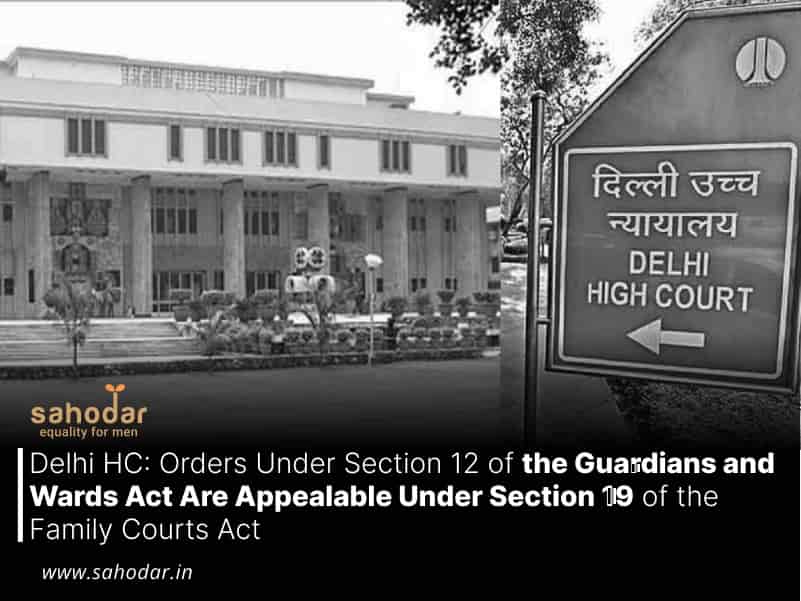The Delhi High Court ruled that orders issued under Section 12 of the Guardians and Wards Act, 1890 (GW Act) can be appealed under Section 19 of the Family Courts Act, 1984 (FC Act).
A Full Bench was established by the Chief Justice following a referral order made by the Division Bench in a matrimonial case.
The Bench comprising Justice Rekha Palli, Justice Jasmeet Singh, and Justice Amit Bansal observed, “… we have no hesitation in agreeing with the appellant and the learned Amicus Curiae that the decision in Col Ramesh Pal (supra), wherein it was held that an order passed under Section 12 of the GW Act would not be appealable under Section 19 of the Family Courts Act does not lay down correct law. We, consequently, answer this reference by holding that orders passed under Section 12 of the GW Act would be appealable under Section 19 of the FC Act.”
In this case, the Division Bench, while addressing an appeal filed by the mother of a minor child, expressed its hesitance in accepting the ruling in Colonel Ramesh Pal Singh v. Sugandhi Aggarwal, MAT.APP.(F.C.) 211/2019. That ruling stated that an order issued under Section 12 of the GW Act during ongoing Family Court Act proceedings is an interlocutory order and therefore not appealable under Section 19(1) of the FC Act. The Court noted that a different interpretation regarding the scope of appeal under Section 19(1) of the FC Act had been established by another Division Bench in Manish Aggarwal v. Seema Aggarwal, (2012) 192 DLT 714 (DB). As a result, the Court concluded that the decision in Colonel Ramesh Pal needed to be reviewed by a Larger Bench.
In light of these circumstances, the Full Bench was formed to evaluate the validity of the decision in Colonel Ramesh Pal. The contested order was issued in response to an application from the minor child’s father, requesting that the child be enrolled in one of three nearby schools. This arrangement would allow the child to be placed in his temporary custody each day after school, instead of being sent to a crèche while the mother was at work.
The High Court after hearing the contentions of the counsel, noted, “… the Family Courts Act still does not define as to what would be an interlocutory order. In these circumstances, there is no reason why the provisions of Section 19 of the FC Act must not be purposively interpreted to include within its ambit all those orders which touch upon matters of moment and have trappings of finality. An order under Section 12 of the GW Act which entitles the Court to grant temporary custody of the child to one of the parents would definitely be an order passed after evaluating the respective contentions of the parties and would necessarily affect not only their rights but also those of the minor child.”
The Court further stated that determining that such an order does not fall under Section 19(1) of the FC Act would not only unduly limit the scope of this appellate provision but would also hinder the Court’s exercise of parents patriae jurisdiction in the best interests of the minor child.
“As we have already held hereinabove that the powers exercisable under the FC Act, could not be controlled by the provisions of other statutes, we are of the view that the criteria prescribed under the GW Act, could not be applied to test whether an order should be treated as an interlocutory order for the purposes of the FC Act”, it said.
The Court also highlighted that simply labeling an order under Section 12 of the GW Act as an interlocutory order does not justify categorizing it as such under the FC Act, which was enacted 94 years later and was designed to offer a broader scope for appeals.
“In our view, in every case, when an order passed by the Family Court Act, is taken in appeal before the High Court, it would be incumbent upon the Court to examine the nature of the impugned order in its entirety to determine whether the same is in the nature of an adjudicatory order which decides valuable rights of the parties. Whenever the Court finds that an order touches upon the vital rights of the parties in contradistinction to an order which is merely a procedural order, an appeal ought to be entertained, irrespective of the fact that the order was passed during the pendency of the proceedings before the learned Family Court”, it also observed.
Accordingly, the High Court answered the reference.

